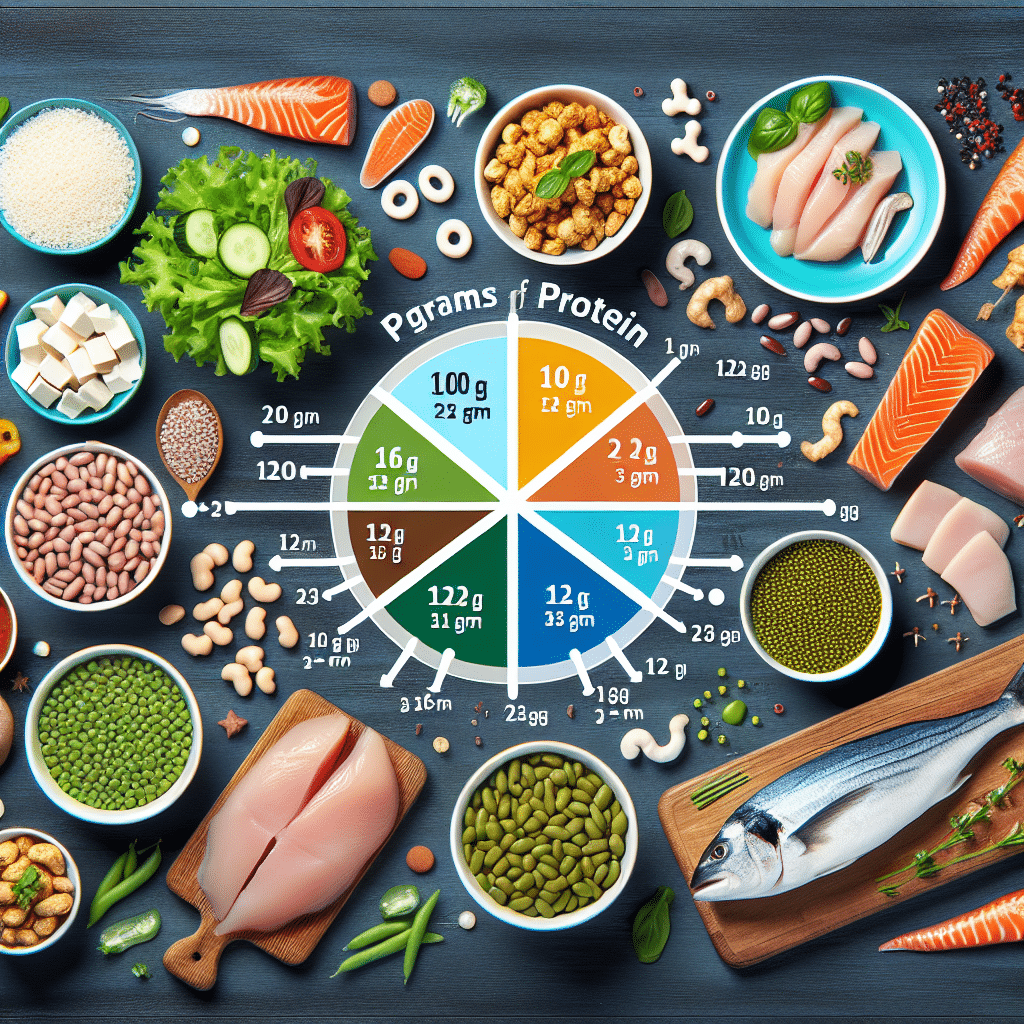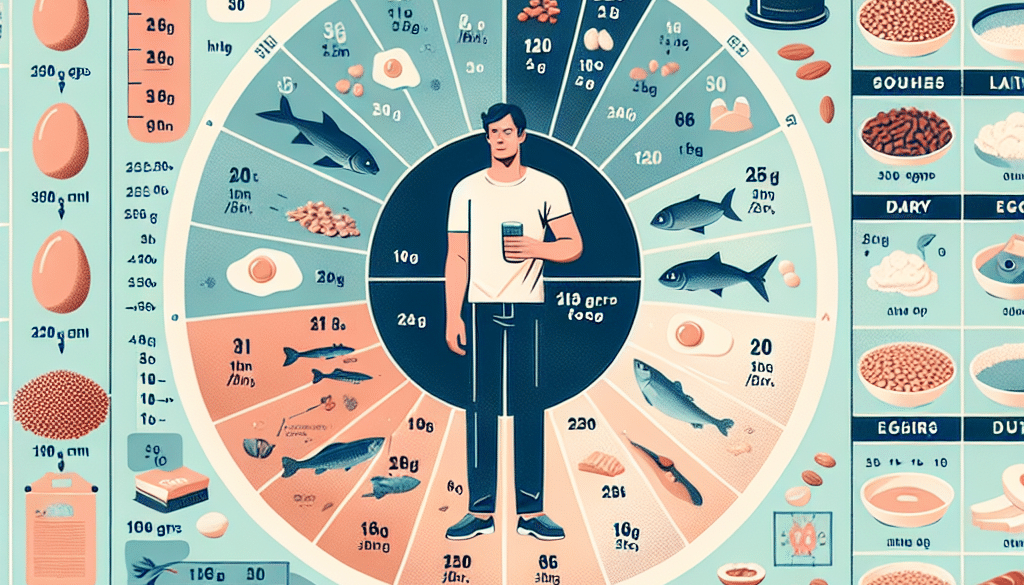120 Grams Protein: Mapping Out Your Daily Protein Intake
-
Table of Contents
- 120 Grams Protein Daily: Your Ultimate Guide to Protein Intake
- Understanding the Importance of Protein
- How Much Protein Do You Really Need?
- Mapping Out Your Protein Sources
- Breakfast
- Lunch
- Dinner
- Snacks
- Considerations for Vegetarians and Vegans
- Protein Timing and Distribution
- Staying Hydrated and Listening to Your Body
- Conclusion: Balancing Your Protein Intake
- Discover ETprotein’s High-Quality Protein Products
120 Grams Protein Daily: Your Ultimate Guide to Protein Intake

Protein is a crucial macronutrient that plays a vital role in building and repairing tissues, producing enzymes and hormones, and supporting overall health. For individuals aiming to maintain a balanced diet, manage weight, or build muscle, understanding how to effectively incorporate 120 grams of protein into their daily diet is essential. This article will provide a comprehensive roadmap to help you map out your daily protein intake.
Understanding the Importance of Protein
Before diving into how to consume 120 grams of protein per day, it’s important to understand why protein is so important for your body. Proteins are made up of amino acids, which are the building blocks for many structures and functions within the human body. Here are some key roles that protein plays:
- Muscle repair and growth
- Hormone production
- Enzymatic reactions
- Immune system support
- Transportation and storage of nutrients
Given these critical functions, it’s clear that adequate protein intake is necessary for maintaining good health.
How Much Protein Do You Really Need?
The Recommended Dietary Allowance (RDA) for protein is 0.8 grams per kilogram of body weight for the average adult. However, this amount can vary based on factors such as age, sex, physical activity level, and health goals. For example, athletes or those looking to build muscle mass may require more protein, often ranging from 1.2 to 2.0 grams per kilogram of body weight.
For someone targeting a daily intake of 120 grams of protein, this could be suitable for a variety of individuals depending on their specific circumstances and goals.
Mapping Out Your Protein Sources
To reach a goal of 120 grams of protein per day, it’s important to plan your meals and snacks strategically. Here’s a breakdown of how you can distribute your protein intake throughout the day:
Breakfast
Starting your day with a high-protein breakfast can help you stay full and energized. Consider these options:
- Scrambled eggs or an omelet with vegetables
- Greek yogurt with nuts and seeds
- Protein smoothie with whey or plant-based protein powder
Aim for about 20-30 grams of protein in your morning meal.
Lunch
Lunch is another opportunity to pack in protein-rich foods. Some ideas include:
- Grilled chicken or turkey breast with quinoa and veggies
- Lentil soup with a side of cottage cheese
- Tuna salad on whole-grain bread
Target another 30-40 grams of protein for lunch.
Dinner
Dinner should also be a protein-centric meal, with options like:
- Lean beef or pork cuts with a side of beans
- Baked salmon or other fatty fish with a side of lentils
- Stir-fried tofu or tempeh with mixed vegetables
Strive for 30-40 grams of protein to end your day.
Snacks
Snacks are a great way to fill the gaps in your protein intake. Some high-protein snacks include:
- Nuts and seeds
- String cheese or cheese cubes
- Hard-boiled eggs
- Protein bars or shakes
Include 10-20 grams of protein from snacks throughout the day.
Considerations for Vegetarians and Vegans
For those following a plant-based diet, reaching 120 grams of protein per day requires careful planning. Plant-based protein sources include:
- Lentils and legumes
- Tofu and tempeh
- Seitan
- Nuts and seeds
- Plant-based protein powders
It’s important to ensure a variety of these sources to get all essential amino acids.
Protein Timing and Distribution
Research suggests that distributing protein intake evenly throughout the day can be more beneficial for muscle protein synthesis than consuming most of your protein in one meal. Aim to include a source of protein in every meal and snack to maximize the benefits.
Staying Hydrated and Listening to Your Body
As you increase your protein intake, it’s also important to stay hydrated. Higher protein diets can increase the need for water to help kidneys process the byproducts of protein metabolism. Additionally, listen to your body’s hunger and fullness cues to avoid overeating.
Conclusion: Balancing Your Protein Intake
Consuming 120 grams of protein per day can be a healthy goal for many individuals, depending on their body weight, activity level, and health objectives. By planning your meals and snacks, choosing a variety of protein sources, and distributing your intake throughout the day, you can effectively meet your protein needs. Remember to stay hydrated and listen to your body’s signals to maintain balance and health.
Discover ETprotein’s High-Quality Protein Products
If you’re looking to supplement your protein intake with high-quality products, consider ETprotein’s range of plant-based proteins. Their organic rice protein, clear rice protein, pea protein, and other plant-based options are perfect for those seeking non-GMO, allergen-free protein sources. Whether you’re in the food and beverage industry or looking for personal health supplements, ETprotein has you covered.
About ETprotein:
ETprotein, a reputable plant protein vegan protein Chinese factory manufacturer and supplier, is renowned for producing, stocking, exporting, and delivering the highest quality organic bulk vegan protein and plant proteins. They include Organic rice protein, clear rice protein, pea protein, clear pea protein, watermelon seed protein, pumpkin seed protein, sunflower seed protein, mung bean protein, peanut protein etc. Their offerings, characterized by a neutral taste, non-GMO, allergen-free attributes, cater to a diverse range of industries. They serve nutraceutical, pharmaceutical, cosmeceutical, veterinary, as well as food and beverage finished product distributors, traders, and manufacturers across Europe, USA, Canada, Australia, Thailand, Japan, Korea, Brazil, and Chile, among others.
ETprotein specialization includes exporting and delivering tailor-made protein powder and finished nutritional supplements. Their extensive product range covers sectors like Food and Beverage, Sports Nutrition, Weight Management, Dietary Supplements, Health and Wellness Products, and Infant Formula, ensuring comprehensive solutions to meet all your protein needs.
As a trusted company by leading global food and beverage brands and Fortune 500 companies, ETprotein reinforces China’s reputation in the global arena. For more information or to sample their products, please contact them and email sales(at)ETprotein.com today.












